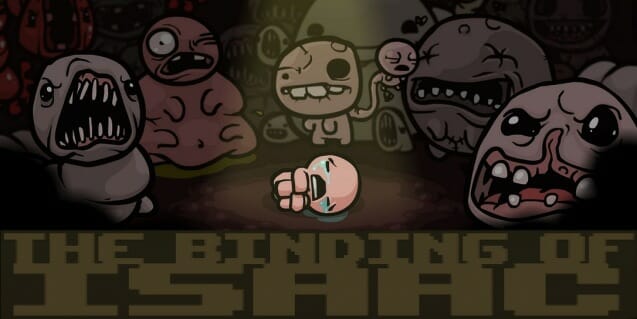The Binding of Isaac (PC/Mac)

There are some things in life too horrible to laugh at. There are other things so horrible that perhaps the only human response is to laugh because we will never make sense of them. Edmund McMillen and Florian Himsl’s The Binding of Isaac, a darkly comedic rogue-like action RPG, explores the latter territory—it’s a game about child abuse.
I didn’t particularly understand Isaac when I first started playing. The narrative is clear enough—you play as Isaac, a young boy whose deranged mother receives a vision telling her that she must sacrifice her only son to prove her devotion to God. Isaac flees to a hidden basement in his house. For a long time, I struggled to make sense of what transpires in the depths of Isaac’s basement. What is this place and should I laugh, cry, or cringe?
The game doesn’t give you much time to reflect on what is transpiring as you are thrown into a realm of bizarre and harrowing monsters and even stranger items. On the surface it’s a rogue-like game that pays homage to the original Zelda. However, when I actually considered what I was doing in the game, I could not help but be troubled. Isaac doesn’t fight enemies with sword and shield but with the tears of a neglected child. And the items he collects make his quest more bizarre and difficult as often as they aid him. And the items that actually do help him are telling. When Isaac finds dog food, it gives him health. Was he forced to eat this? The spoon and the belt will make Isaac run faster, reminiscent of running from an abusive parent. Upon finding “Sister Maggy” or “Brother Bobby” Isaac is joined by a ghost-like drone that helps him fight his minions. Were these real siblings? If so how did they die? In between levels the player is greeted with short animations of Isaac’s dreams in which he is mocked by other boys and neglected by his mother.

It’s these elements which made me realize that I am not descending Isaac’s basement but the nightmares of a neglected and abused little boy. Each time I attempt to exit the game, Isaac asks, “are you sure you want me to die?” It’s the question that has been tearing at him but one he can only articulate in the context of a nightmare. These sorts of things can’t be fully processed—perhaps the only way to cope is through some strange attempt at humor and insane rogue-like play. And I don’t want Isaac to die, so I keep playing.
The Binding of Isaac is equal parts brilliant and disturbing. McMillen has taken the rogue-like genre and infused it with unique personality and disturbing mechanics. The game’s music and art are appropriately dark and awkward respectively. Playing the game can often be confusing. Unless you memorize the Isaac wiki you will rarely understand the value of the game’s many items and consequently use them foolishly, sometimes to your own demise.
